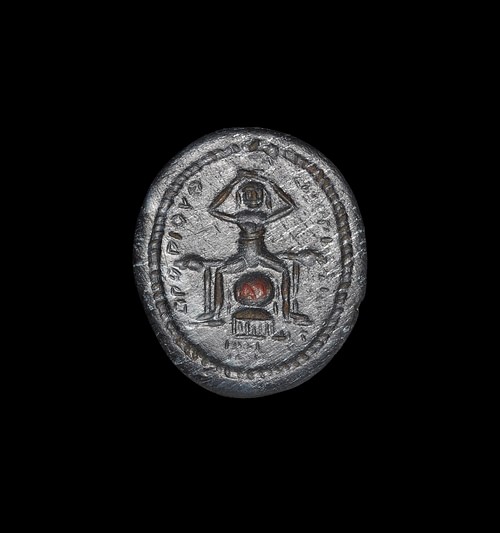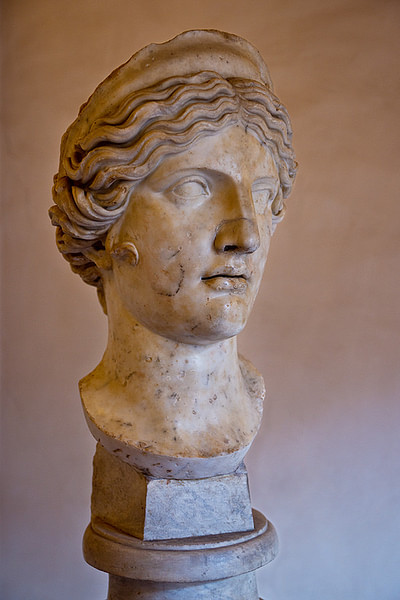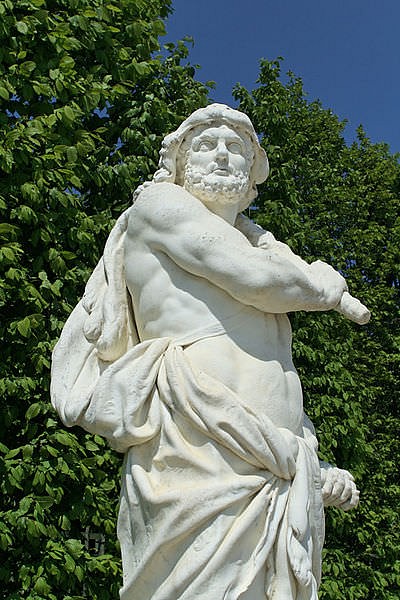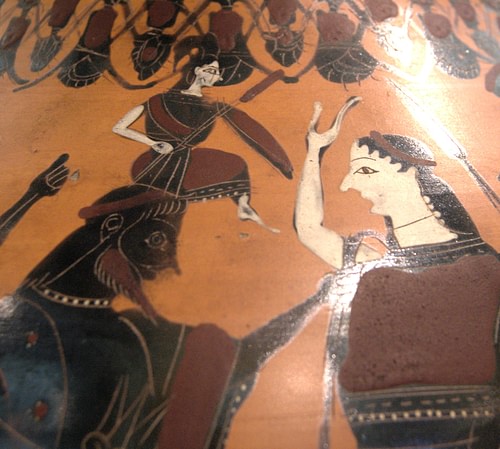
Eileithyia (or Ilithyia) was the goddess of childbirth in Greek mythology, with the power to either help or hinder childbirth. She most famously played a role in the birth of Hercules and Apollo. Eileithyia was the daughter of Zeus and Hera and often sided with her mother to make the births of Zeus' illegitimate children more difficult.
Eileithyia was often referred to in the plural form as Eileithyiai and as Hera's daughters before being transformed into a singular figure. Eileithyia was widely worshipped throughout the Greek world for hundreds of years. Her Roman counterpart was Lucina.
Birth & Family
According to Hesiod (c. 700 BCE) in his Theogony, Eileithyia was the daughter of Zeus and Hera and the sister of Ares, the god of war, and Hebe, the goddess of eternal youth.
Last he took blooming Hera for his wife;
Uniting with the king of gods and men,
She gave him Hebe and Ares, and she bore
The goddess Eileithyia to her mate.(Hesiod, Theogony, 921-925).
Goddess of Childbirth
As the goddess of childbirth, Eileithyia presided over the birth of humans and gods. According to Homer (c. 750 BCE), who referred to her both in the plural and singular forms, Eileithyia brought on the sharp labour pains that women suffered. In his Histories, Herodotus (c. 484 to 425/413 BCE) writes about two Hyperborean girls, Hyperoche and Laodice, who travelled to the island of Delos to bring offerings to Eileithyia so that they may have an easy birth. Eileithyia had to be physically present for a birth to occur.
Eileithyia played a mostly negative role in Greek mythology. She often sided with her jealous mother and helped her enact revenge on Zeus' multiple lovers by making their labours difficult and making it harder for Zeus' illegitimate children to come into the world.
The Birth of Hercules
As Alcmene got ready to give birth to Zeus' son Hercules, Zeus prophesied to the Olympian gods that on that day, a descendant of Perseus would be born who would become the future king of Mycenae. A jealous Hera did not want her husband's son to have such high status, so she ordered Eileithyia to sit outside the room where Alcmene was labouring and cross her legs, arms, and hands to delay the birth by nine days.
Hera got Eileithyia to organise the premature birth of another baby boy, Eurystheus, who just happened to be another descendant of Perseus and a cousin of Hercules. By delaying Hercules' birth, Hera could ensure that Eurystheus would become the ruler of Mycenae instead of Hercules.
Hercules was finally born after Alcmene sent a servant girl named Galanthis to falsely report that Hercules had already been born. Upon hearing this, Eileithyia jumped up in surprise, uncrossing her legs and arms, and Hercules was born. When she found out that she had been tricked, the servant girl was turned into a weasel as punishment.
After Hera had boasted about keeping Eileithyia away from Alcmene during her labour, Zeus was so angry with her that he took his oldest daughter, Ate, and punished her for hiding Hera's treachery from him. He then got Hera to promise that Hercules could become a god if he could pass the twelve labours that his cousin Eurystheus set for him.
Apollo's Birth
As mentioned in The Homeric Hymns, Hera also used Eileithyia to interfere in the birth of Apollo, another of Zeus' illegitimate sons, with the goddess Leto. To prepare for the coming birth, Leto surrounded herself with goddesses on the island of Delos. However, there was one notable absence – Eileithyia, who was being kept distracted by Hera on Mount Olympus while Leto laboured for nine days and nine nights.
Hera knew that Leto would give birth to another strong son of Zeus and was doing anything she could to stop the birth. The goddesses sent Iris, messenger to the gods, to fetch Eileithyia so Leto could finally give birth. They promised her a beautiful golden necklace if she would leave Hera and come to Delos to help with Leto's labour.
And when she reached the home of the gods,
sheer Olympus, immediately she called Eileithyia
out of the hall to the door and spoke to her
winged words, telling her everything,
just as the goddesses who live on Olympus
had urged her to.
So she won over Eileithyia's heart,
and they went away, stepping softly
on their feet like shy wood doves.
Now as soon as Eileithyia, the goddess
who helps women in labour,
touched Delos, the moment of birth
seized Leto and she longed to deliver.(The Homeric Hymns: Hymn to Apollo, 3.109-117).
Sosipolis & Eileithyia
On one occasion, the Olympians were anticipating an attack from the Arcadians. As the Eleans devised a battle plan, a strange woman appeared holding a baby. She had been told in a dream that she had to hand her baby over to the Eleans to help them in their fight against the Arcadians. The Elean army took the baby with them on their march against the Arcadians. Once the Arcadians advanced upon them, the baby suddenly turned into a serpent, and the Arcadians retreated in a panic.
The serpent disappeared into the ground, and a temple dedicated to Eileithyia was built on the spot near the Hill of Cronus in Olympia. Offerings were made to the baby in the name of Sosipolis (Saviour of the State) and to Eileithyia, who was believed to have been the divine mother or nurse of the baby.
Eileithyia & Eros
According to Pausanias (c. 115 to c. 180 CE), the legendary poet known as Olen wrote hymns for Delos, including one he wrote for Eileithyia where he speaks about Eileithyia being a "good spinner," indicating that she was identified as being one of the Fates. He stated that she was older than Cronus and referred to her as Eulinos, stating that she was the mother of Eros. This gave credence to the fact that some local cults believed that Eileithyia was a form of Aphrodite.
In Art
In classical art, Eileithyia naturally appears in many birthing scenes, including the famous birth scene of Athena, where she observes Athena emerging from the head of Zeus. This scene is painted onto a black-figure amphora dating to c. 550 BCE. It is currently exhibited at the Louvre Museum in Paris.
Worship
As the goddess of childbirth, there were many cults and worship sites dedicated to Eileithyia, which were found across the ancient Greek world. In his Description of Greece, Pausanias mentions a shrine of Eileithyia which could be found in Attica. The Delians offered sacrifices to Eileithyia and sang Olen's hymn to her. In Corinth, near the Tenean Gate, another sanctuary was dedicated to Eileithyia. In Achaea was a shrine to Eileithyia, along with shrines to Demeter, Aphrodite, and Dionysos.
Another sanctuary in Corinth, dedicated to Eileithyia, was said to have been founded by Helen of Sparta (Helen of Troy) after she had fallen pregnant and given birth to a baby in Argos. This baby was given to Clytemnestra and King Agamemnon of Mycenae to raise while she married King Menelaus of Sparta. In Messenia, there was a shrine dedicated to Eileithyia with a stone statue of her near the Hall of the Kouretai (rustic spirits), where sacrifices to animals were carried out. In the city of Kleitor in Arcadia, there were multiple sanctuaries dedicated to the gods, with one of the most distinguished being Eileithyia's.
In Eleia (Elis), there was a sanctuary to Eileithyia where Sosipolis (the City Saviour) was also worshipped. The Eleans identified Eileithyia as an Olympian and selected a priestess for her every year. Eileithyia's altar could be found in the front section of the sanctuary, where virgin girls and older women went to sing hymns and burn incense to both the City Saviour and Eileithyia. However, the worshipping public was only allowed in Eileithyia's section of the sanctuary, not the City Saviour's.
A sanctuary to Eileithyia could also be seen in Laconia (Sparta), along with Apollo and Artemis. The people of Laconia built it and recognised Eileithyia as a goddess on the orders of the Oracle of Delphi. In the holy precinct in Arcadia, there was a sanctuary dedicated to Asclepius and a hill containing statues of the Homeric 'worker' gods (gods known to do hard work), including Eileithyia.
In the Arcadian town of Tegea, there was a temple and statue of Eileithyia in the marketplace. The Tegeans called Eileithyia 'Auge-on-her-knees' after King Aleos of Arcadia handed off his daughter Auge to be drowned after she was found to be pregnant. When she was captured, she fell on her knees and gave birth to a son. The site where she gave birth was where the Tegeans built the Sanctuary of Eileithyia.
Although Eileithyia played a relatively minor role in Greek mythology, her many worship sites show that she was a goddess who was held in high regard in the ancient world. As the goddess of childbirth, many women prayed and made offerings to her in the hope that they would have a safe labour and a healthy baby.











